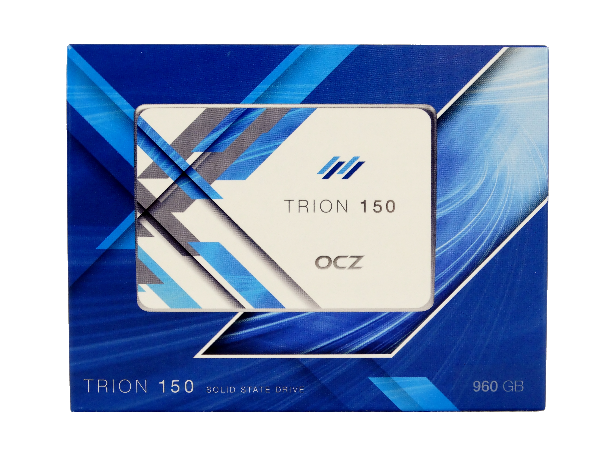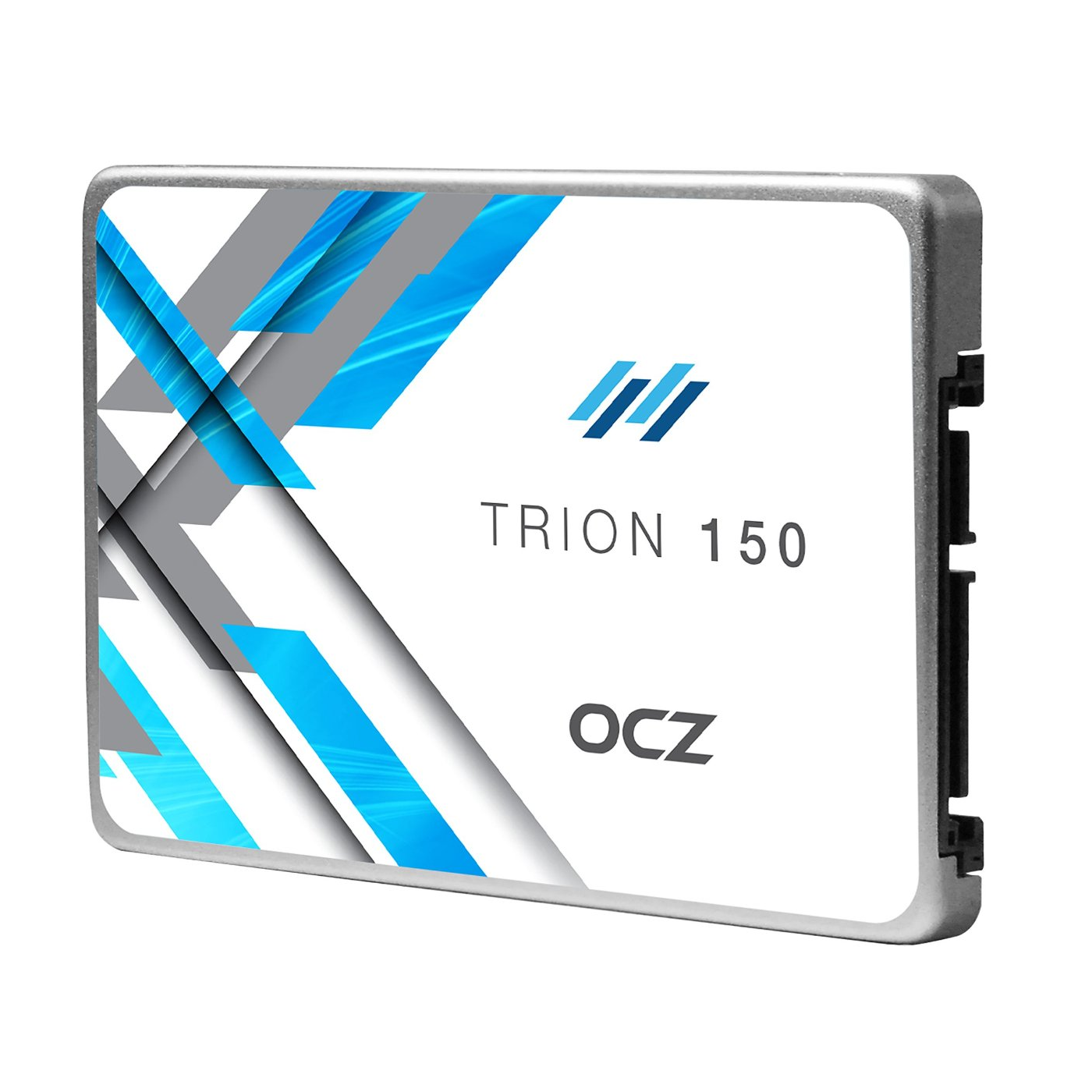Early Verdict
Products like the OCZ ARC 100 and Zotac Premium Edition with MLC flash disarm any value arguments from the Trion 150 right out of the gate. The new Trion improves on some of the performance limitations found in the original model, but that's still not enough to make this a serious option for shoppers.
Pros
- +
OCZ's ShieldPlus warranty and SSD Guru software are among the best available. The Trion 150 includes both if you're willing to overlook some of its shortcomings.
Cons
- -
The Trion 150 is a welcome replacement for the poorly-received Trion 100, but it's still not as competitive as it needs to be. It's difficult to recommend this model when the same company offers an MLC-based SSD for the same price.
Why you can trust Tom's Hardware
Specifications, Pricing, Warranty And Accessories
OCZ Storage Solutions released its Trion 100 last July. We had high hopes for the series, and for Toshiba's triple-level cell (TLC) flash. The Trion was to be the company's entry-level solution designed for first-time SSD owners and anyone looking for excellent value.
With regard to the flash, Toshiba has routinely delivered products that run faster than its rival Micron. But our results came far from meeting those expectations. The Trion 100 launched with an inflated price tag and its performance just wasn't good. In the end, the drive was a disappointment. OCZ's new Trion 150 was designed to address its predecessor's shortcomings, and we expect it to be a much better entry-level SSD.
On paper, the only difference between the Trion 100 and 150 is flash. OCZ went with Toshiba's 15nm TLC for its new models. This should allow the company to drop its price tag and truly get the Trion into entry-level territory.
There is more to the Trion 150 story, though. In the background, OCZ manipulated its firmware to enable writes directly to the NAND dies. This increases sequential write performance after the emulated SLC buffer layer fills up and can no longer accept data. The boost can be as high as 50 percent, which makes the drive more attractive to anyone who installs large software packages or transfers lots of data from a wired network.
OCZ also "fixed" its pricing situation. At launch, the 960GB Trion 100 sold for $370. A similarly-sized Trion 150 goes for $270. The Trion 150 at its other capacity points is also quite a bit cheaper to better compete in the cutthroat entry-level SSD space.
Specifications
MORE: Best SSDs For The Money
MORE: Latest Storage News
MORE: Storage in the Forums
Aside from the change in flash, OCZ's specifications remain the same from its previous Trion effort. We're testing the 960GB and 480GB models today, but OCZ also has 120GB and 240GB Trion 150s.
Get Tom's Hardware's best news and in-depth reviews, straight to your inbox.
The drives in our lab are both rated for sequential reads up to 550 MB/s and sequential writes at 530 MB/s. Their random read performance is specified at 90,000 IOPS. Writes are different, though. The 960GB Trion 150 peaks at 64,000 IOPS, while the 480GB model tops out at 54,000 IOPS according to OCZ. The smaller Trion's steady state performance is also slightly behind the 960GB flagship—3600 IOPS compared to 3200.
The Trion 150's endurance ratings fall in line with industry standards for the entry-level market. This series does not support full disk encryption like some of the other drives available at this low price do. I personally don't believe that the lack of FDE is a deal-breaker for most enthusiasts. Even though the technology is widely available in many mainstream SSDs, very few people use it.
Pricing, Warranty And Accessories
The entry-level market is dominated by discussions of cost. Most of the folks shopping at these price points want exceptional value, and price typically rules supreme over other considerations. The Trion 150 shipped to reviewers the same day it appeared on Newegg and other sites. You'll find the 960GB model available at $270 and the 480GB version going for $140. The 240GB and 120GB models sell for $72 and $46, respectively.
All four drives include a three-year ShieldPlus Warranty, which allows you to schedule an RMA and have a replacement shipped to you before sending OCZ the original drive. This minimizes downtime and streamlines the process. You can learn more about this unique approach to coverage here.
As a value-oriented SSD, the Trion 150 does not include an accessory package. But you do gain access to OCZ's SSD Guru software.

Chris Ramseyer was a senior contributing editor for Tom's Hardware. He tested and reviewed consumer storage.
-
hdmark is anyone else still kind of blown away that SSD's are getting this cheap? maybe im just in a nostalgic mood but I remember when SSD's cost a TON more than this and now were seeing 960gb for almost a quarter a gbReply -
zhunt99 Replyis anyone else still kind of blown away that SSD's are getting this cheap? maybe im just in a nostalgic mood but I remember when SSD's cost a TON more than this and now were seeing 960gb for almost a quarter a gb
I'm right there with you. I picked up a 480 gb Sandisk Ultra II over black friday for $110. I was pretty happy with that.
-
ssdpro The value has gotten quite good. I also beliew SSDs are at a good value point right now. Sure, they can go lower and closer to HDDs in cost/GB, but you also don't want HDD performance, power consumption, or weight.Reply
OCZ products on the other hand are complicated. Seeing early review returns from actual customers isn't going so well. Some SKUs are showing early failures just like the Trion 100. OCZ needs to make a few drives that are so reliable none fail. Supercaps, full pfail circuitry, two controllers, whatever even at a loss if necessary. OCZ's enemy is reputation and reality. -
stevenrix When your OCZ ssd runs out of IOPs or fails, try to reflash it, sometimes it will reset the # of IOPS and put it back to 0 and it will work again....Reply
-
alidan Replyis anyone else still kind of blown away that SSD's are getting this cheap? maybe im just in a nostalgic mood but I remember when SSD's cost a TON more than this and now were seeing 960gb for almost a quarter a gb
cheap to the point that in my next computer i was considering a 512gb drive, but now im looking at 900+gb drives... not so much for their boot as i could get by with a 256 drive for just that, but as a loading heavy game drive too.
granted the next pc i build will get partitioned to hell and back due to the boot options i want, possibly a win 7 partition, a second one that is just os for emergency my main os crapped up, win 10 and the same, then some linux distros for playing around with. should be able to get all that and my required programs to run on less then 300gb, so the rest could be for load heavy games. -
Sakkura Terabyte SSDs are flirting with the $200 barrier. Quite nice, but I'm going to hang onto HDDs for secondary storage for a while longer.Reply -
jrharbort Replyis anyone else still kind of blown away that SSD's are getting this cheap? maybe im just in a nostalgic mood but I remember when SSD's cost a TON more than this and now were seeing 960gb for almost a quarter a gb
At the sacrifice of overall speed and endurance. -
cryoburner ReplyAt the sacrifice of overall speed and endurance.
That implies you actually need that additional speed and endurance though. How many users need a drive that can handle a petabyte of writes? It's unlikely that you'll write much more than a terabyte of data to your system drive each year, so write endurance shouldn't matter much outside of specialized usage scenarios like database servers. I'm not sure if you ever saw that endurance test that Tech Report ran, but they performed continuous writes on various SSDs until failure...
https://techreport.com/review/26523/the-ssd-endurance-experiment-casualties-on-the-way-to-a-petabyte
Their 250GB Samsung 840 Evo with TLC flash survived over 900TB of writes in that test, and they didn't detect any uncorrectable errors until after 200TB. That would be over 100 years of typical desktop usage, making the endurance of the TLC a non-issue.
And as for performance, just look at the "Real-World Software Performance" benchmarks here. All these drives perform very similarly under most usage scenarios to the point where it's unlikely you would notice any notable difference between them in day to day use. Software is still designed with the performance limitations of hard drives in mind, so aside from perhaps large file transfers and some other fringe scenarios, you're not likely to see a huge difference in performance between lower and higher end SSDs.
And ultimately, if the endurance is far higher than what people using the drive will actually need, it makes sense to trade some of that headroom for additional capacity. Cost per gigabyte is the main thing holding SSDs back from universal adoption over hard drives, and multi-level cell flash is helping to bring those prices down to be competitive. -
samopa The elephant on the room is reliability. People tend to buy large storage to hold their valuable data. If performance is what they need, RAID 0 of small disks usually is enough.Reply
OCZ is not well-known for their reliability, and most people do not want to store their valuable data on unreliable media. In past few years, I only used Samsung and Intel brands for SSD, yes they cost higher than competing brand like OCZ, but (at least) to me, the value of my data are even higher than that.
So, are they improved their reliability ? I do not want to to loose my dear data overnight because like some people here, I only backup my personal data once a week. -
Sakkura Reply17699394 said:The elephant on the room is reliability. People tend to buy large storage to hold their valuable data. If performance is what they need, RAID 0 of small disks usually is enough.
OCZ is not well-known for their reliability, and most people do not want to store their valuable data on unreliable media. In past few years, I only used Samsung and Intel brands for SSD, yes they cost higher than competing brand like OCZ, but (at least) to me, the value of my data are even higher than that.
So, are they improved their reliability ? I do not want to to loose my dear data overnight because like some people here, I only backup my personal data once a week.
OCZ had major reliability problems in the early Sandforce days, that's for sure. They were actually improving later on as firmware problems were ironed out and so on. They probably just jumped on the Sandforce bandwagon a bit too quickly. Anyway, improvements or not they went bankrupt. Toshiba bought them up, and if they weren't high quality before, they are now.
Meanwhile, Samsung has had its misstep with the 840 and 840 Evo. But their 850 Evo is great. Again it seems like being an early adopter, this time of TLC NAND, caused issues.
Personally I have an OCZ Agility 3 from 2012 (before the bankruptcy), and it's running just fine. Not that it proves much.

